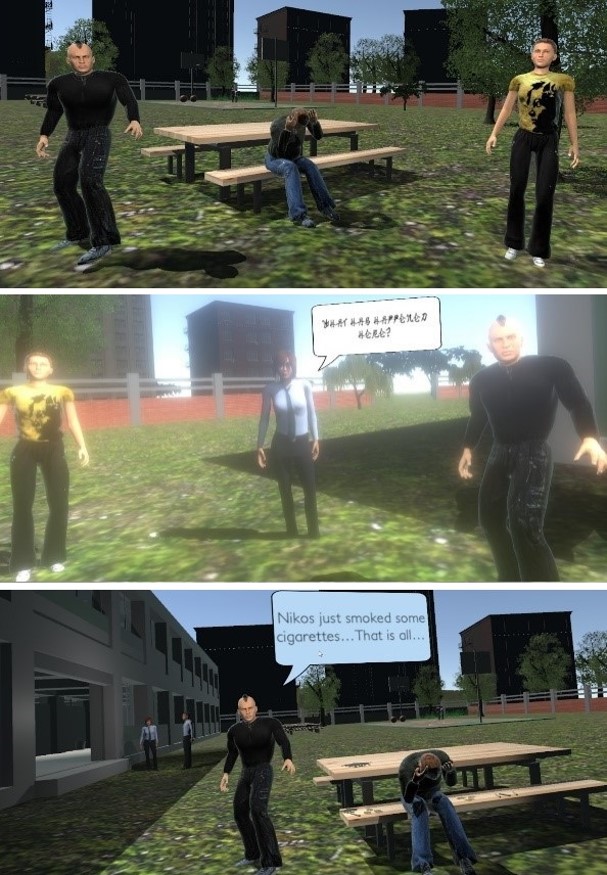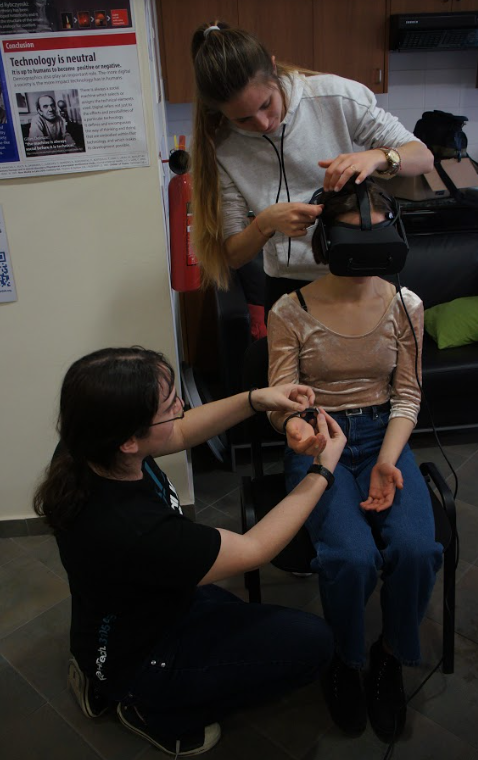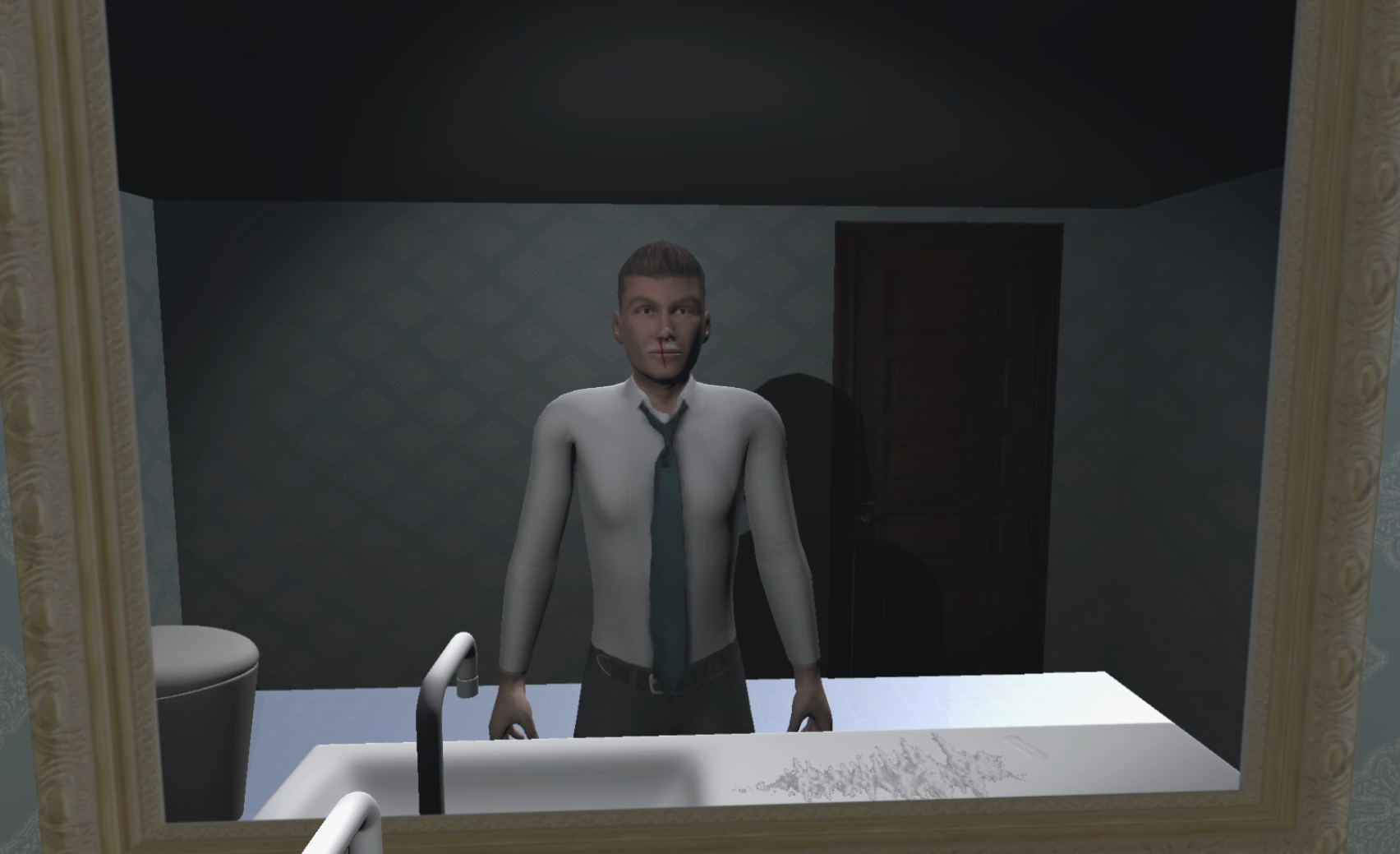The study of attitude change has been of interest for decades, with social professionals, having to deal with real actors, written words, and relying on old software and hardware to achieve their goals. Virtual Reality (VR), due to its immersive, transformative and engaging form, and its ability to make users feel like they are part of the virtual world that surrounds them, can be a useful medium to affect peoples’ attitudes, including emotions, behavior, knowledge, and beliefs over an entity.
This dissertation, through a series of three experimental studies, delves into whether VR can be used as a medium for attitude change, in order to modernize the existing traditional methods used by social professionals.
Study 1 – The first study (Christofi et al., 2018, Stavroulia et al., 2018, Stavroulia et al., 2019) examined the effect of viewing in VR, a drug incident at a school environment from different perspectives and viewpoints in relation to the level of presence achieved and the effects on mood states and empathy of teachers who were immersed in a virtual school where a drug use incident took place. Participants were randomly assigned to one of two groups, in which they viewed the scenario twice from the eyes of whether the teacher and the drugged student (Group 1), or the teacher and a healthy student (Group 2). Their body and head movements were mapped in real time to the virtual body using the Microsoft Kinect. Partcipants’ heart rate and brain signals were measured using specialized equipment (a fitness wristband and the 14-channel wireless EEG EMOTIV EPOC+).
Study 2 – Through the support of sensorimotor contingencies, people can use natural movements to view and interact with the virtual world around them. In the second study, we compared a perspective-taking immersive Virtual Reality system which supports a number of sensorimotor contingencies (SC group) with a perspective-taking desktop system of the same application but with a minimum support of sensorimotor contingencies (NSC group), to investigate the effect of the supported sensorimotor contingencies in promoting empathy and positive attitudes toward drug users. Partcipants in the SC group viewed the application through the Oculus Rift and had to wear the Xsens motion tracking suit for real time body movement tracking and the Manus VR gloves which offered finger tracking. Participants in the NSC group viewed the application through a computer screen, and could interact with the application by using a mouse.
Study 3 – In this study, given that a 3D digital reconstruction can be used along with different technologies, an interactive application was designed and developed, where users can navigate and get information about the site, for two different systems: Virtual Reality (VR) systems and desktop computers. A study was conducted to examine whether the use of a VR-based simulation can change peoples’ cognitive attitudes about an archaeological site more effective than a more traditional method.
PAPERS
[j] Kyrlitsias, C.*, Christofi, M.*, Michael-Grigoriou, D., Banakou, D., & Ioannou, A. (2020). A Virtual Τour of a Hardly Accessible Archaeological Site: the Effect of Immersive Virtual Reality in User Experience, Learning and Attitude Change. Frontiers in Computer Science, 2, 23.
*equal contribution.
[j] Christofi, M., Michael-Grigoriou, D., & Kyrlitsias, C. (2020). A Virtual Reality Simulation of Drug Users’ Everyday Life: the Effect of Supported Sensorimotor Contingencies on Empathy. Frontiers in Psychology, 11, 1242.
[j] Stavroulia, K. E., Christofi, M., Baka, E., Michael-Grigoriou, D., Magnenat-Thalmann, N., & Lanitis, A. (2019). Assessing the emotional impact of virtual reality-based teacher training. The International Journal of Information and Learning Technology, 36(3), 192-217.
[b] Stavroulia, K. E., Christofi, M., Zarraonandia, T., Michael-Grigoriou, D., & Lanitis, A. (2019). Virtual Reality Environments (VREs) for Training and Learning. In Learning in a Digital World (pp. 195-211). Springer, Singapore.
[c] Christofi, M., Kyrlitsias, C., Michael-Grigoriou, D., Anastasiadou, Z., Michaelidou, M., Papamichael, I., & Pieri, K. (2018). A tour in the archaeological site of choirokoitia using virtual reality: a learning performance and interest generation assessment. In Advances in Digital Cultural Heritage (pp. 208-217). Springer, Cham.
[c] Christofi, M., Baka, E., Stavroulia, K. E., Michael-Grigoriou, D., Lanitis, A., & Magnenat-Thalmann, N. (2018). Studying Levels of Presence in a Virtual Environment Simulating Drug Use in Schools: Effect on Different Character Perspectives. ICAT-EGVE 2018 – International Conference on Artificial Reality and Telexistence and Eurographics Symposium on Virtual Environments. The Eurographics Association.
[c] Stavroulia, K.E., Baka, E., Christofi, M., Michael-Grigoriou, D., Magnenat-Thalmann, N. & Lanitis, A. (2018). A virtual reality environment simulating drug use in schools: effect on emotions and mood states. International Conference on Information, Communication Technologies in Education, ICICTE 2018 (pp. 225-234). Chania, Greece.
[c] Christofi, M., & Michael-Grigoriou, D. (2017, October). Virtual reality for inducing empathy and reducing prejudice towards stigmatized groups: A survey. In 2017 23rd International Conference on Virtual System & Multimedia (VSMM) (pp. 1-8). IEEE.




